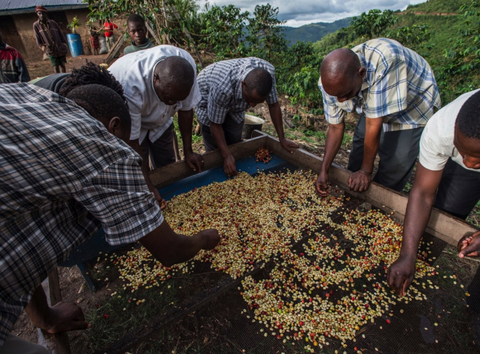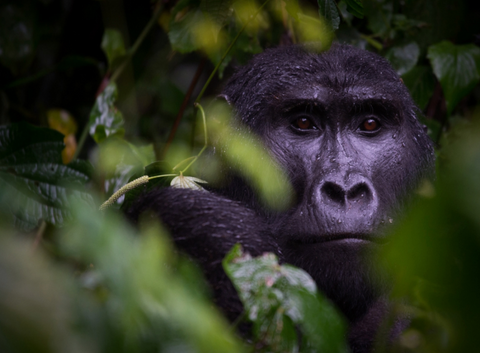What is gorilla conservation coffee?
Gorilla Conservation Coffee is a social enterprise established in 2015 through Conservation Through Public Health (CTPH), an award-winning NGO non-profit organization. CTPH focuses on preventing disease transmission between humans and gorillas living around Bwindi International Park in Uganda.

Gorilla Conservation Coffee helps to preserve the endangered mountain gorillas by providing sustainable financing for their protection by giving farmers a viable alternative livelihood through coffee farming that takes the pressure off the gorillas and their habitats, and where a donation from sales of every coffee bag goes to support community health, gorilla health and conservation programs at Bwindi, which are preventing disease transmission between people and gorillas.
Why did Conservation Through Public Health Chose coffee?
Coffee was already growing in the land but the farmers were still struggling. Their biggest problem was not having a steady market or steady prices for their coffee. People abandoned their effort to grow Arabica coffee beans ( which is a higher quality coffee bean ) because the coffee traders were being paid a little amount of money regardless of the bean type.
The lack of market share caused those farmers poverty, which led them to go into the forest to hunt for the meat that they couldn’t afford to buy.
Deforestation of the gorilla’s habitat started growing drastically because when the farmers needed wood, they collected firewood from the park.
The increase in poverty also led to diseases that were being transmitted between humans and gorillas.
The health for the local communities was getting really bad and the gorillas were suffering too. Humans don’t have steady income and gorillas were losing their home.
Something had to be done.
That's when CTPH created Gorilla Conservation Coffee. The Uganda Coffee Development Authority recommended a coffee expert who guided them into setting high-quality standards for coffee.
They worked together on creating a specific set of guidelines for the farmers to perfect their coffee in order to compete.
The framers understood that they have to be consistent if they wanted people to buy their coffee. So they followed these guidelines from figuring out the perfect time for picking the cherries to choose when to pull them — all things that contribute to a superior product.

Gorilla Conservation Coffee helped the farmers create the Bwindi Coffee Growers Cooperative. Now the coffee cooperative has 85+ farmers and the chairman of the cooperative sits on the board of GCC.
Now their message is clear and can be well heard.
The coffee is 100% premium Arabica that is selectively harvested for only red ripe cherries, hand picked, wetly processed and dried under shade. The coffee is roasted medium and packed to the highest quality standards. Each cup has a unique aroma with hints of caramel, butter notes, and almond, with a citrus taste and a sweet finish. The most popular coffee is Kanyonyi Coffee, named after Kanyonyi.
But Who is Kanyonyi?

Kanyonyi was named after the little stream where he was born in 1996. The 100% Arabica Kanyonyi Coffee is the first coffee product and named after the former lead silverback gorilla of Mubare Gorilla Group, the first group habituated for tourism at Bwindi Impenetrable National Park.
Gorilla Conservation coffee has named the blend after Kanyonyi because he signifies what has been achieved in conservation since Bwindi Impenetrable Forest was made a national park in 1992 and tourism began in 1993. Kanyonyi’s father – Ruhondeza – was heading Mubare group when tourism began in Bwindi, and his accommodating nature brought significant benefits to the Bwindi local community.
Dr. Gladys Kalema-Zikusoka, as the first Veterinary Officer of the Uganda Wildlife Authority, successfully operated on Kanyonyi’s older sister who had a rare condition of rectal prolapse, and was named Kahara because she liked to babysit her younger brother, Kanyonyi. When Ruhondeza died in 2012 the local community came to pay their last respects, showing that their relationship with the park management has greatly improved and that the local community values mountain gorillas.
Gorilla Conservation Coffee hopes are that the Kanyonyi Coffee Blend will continue to build upon these conservation efforts by providing a meaningful livelihood to farmers who live next door to the critically endangered mountain gorillas.
You can read more about Kanyonyi and mountain gorilla conservation on the Conservation Through Public Health web site.
Arabica Coffee is helping support Gorilla Conservation Coffee by bringing their coffee to the United States. The coffee has met our standards in terms of quality and we have decided to roast it locally in Portland, Maine.
Click here to buy Gorilla Conservation Coffee for yourself, family and friends around the world to support and a good cause. Join us in #SavingGorillasOneSipAtATime
